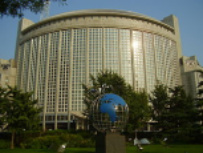West Phoenicia Ministry of Homeland Affairs
This article is incomplete because it is pending further input from participants, or it is a work-in-progress by one author. Please comment on this article's talk page to share your input, comments and questions. Note: To contribute to this article, you may need to seek help from the author(s) of this page. |
 Ma'at Building | |
| Executive Department overview | |
|---|---|
| Formed | June 8, 1955 |
| Jurisdiction | Empire of West Phoenicia |
| Headquarters | Ma'at Building Melbourne-Haven, Jackson; Empire of West Phoenicia |
| Employees | 40,000 |
| Annual budget | $48 billion |
| Ministers responsible |
|
| Deputy Minister responsible |
|
| Child agencies | |
The Ministry of Homeland Affairs is the West Phoenician government interior
executive ministry created with the responsibility for national security, law enforcement, emergency management, border control, immigration, refugees, citizenship, multicultural affairs, cyber security, and disaster prevention.
Organisation Structure
The Ministry of Homeland Affairs is headed by the Minister of Homeland Affairs with the assistance of the Deputy Minister.
Each agency is headed by a director who answers to The Minister or Deputy Minister of Homeland Affairs.
Citizenship and Immigration Services and Customs and Border Protection directors answer to The Minister of Immigration and Border Protection.
Agencies and Departments
| Agency | Head of Agency |
|---|---|
| West Phoenicia Security Intelligence Organisation | Justin Burnley; Director |
| Management Directorate | Gracie Yun; Director |
| Science and Technology Directorate | Shivandra Devi; Director |
| Office of Intelligence and Analysis | Inga Kussy; Director |
| Office of Strategy, Policy, and Plans | Allan Cohan; Director |
| Citizenship and Immigration Services | Cleopatra DeVille; Director |
| Customs and Border Protection | Napali Black; Acting Director |
| Cybersecurity and Infrastructure Security Agency | Emily De Hunn; Director |
| Emergency Management Agency | Nigel Guss; Acting Director |
| Law Enforcement Training Centres | Costa Vendella; Director |
| West Phoenicia Secret Service | Ryan Van Housen; Director |
| Office of Legislative Affairs | Jane Meadows; Director |
| Office of Public Affairs | Fi Dye; Director |
| Office of Operations Coordination | Kimberly Franks |
| Privacy Office | Sir Clifford Vines |
| Office for Civil Rights and Civil Liberties | Lateesha Baroda-Wigg; Director |
| Office of the Inspector General | Carlos Van Berk; Director |
| The Un-West Phoenician Activities Committee | Prince Gai Bush; Director |
Immigration and Citizenship
National Police Force
The West Phoenician National Police force enforces national law and protects citizen's and national interests from crime in West Phoenicia.
The National Police Force falls under the jurisdiction of the Ministry of Homeland Affairs and National Federal government of West Phoenicia.
City-state police foces fall under the jurisdiction of the City-state governments.
Federal uniformed agents are based in each West Phoenician city state capital city forming the largest component of the National Police force staff. Federal agents chiefly perform criminal investigative duties. Non uniformed staff are generally found in Melbourne-Haven undergoing admiiterative duties, however a small number are assigned to each National Police Force office throughout the empire.
The National Police also strongly work alongside agents of the West Phoenician Security and Intelligence Organisation.
Current areas of focus for the West Phoenician National Police:
- Illicit drug trafficking
- Organised people smuggling
- Human Trafficking
- Major fraud
- High-tech crime involving information technology and communications
Prevention, countering and investigation of terrorism
- Transnational and multi-jurisdictional crime
- Money laundering
- Organizmsed crime
- Policing External Territories and Islands.
As of 2020 there is a total of 35,000 sworn and unsworn members of the National Police force.
Controversy
West Phoenician Citizenship Debacle
In 2018 West Phoenician Minister of Immigration Harry Heniel came under fire for what was known as the West Phoenicia Citizenship Debacle.
Harry Heniel, a member of the Antebellum Party before the party merged with the Conservative Party come under fire with his introduction of a controversial plan to fast track citizenship for sport stars of other nations.
The plan dubbed "Paving the Road to Glory" will allow active sport stars and athletes to be given automatic citizenship in exchange for them representing West Phoenicia in the Winter and Summer Olympicss as well as other high profile sports like Baseball, Basketball, Tennis and Football. The goal is to bring in talent and excellence to boost West Phoenicia in sports where they are struggling.
As well as automatic citizenship granted for the athlete it allows their family to be granted citizenship and pick of location of where they want to live with further financial assistance given for relocation costs as well as waiving the $5000 Citizenship application fees and others associated with it.
The Opposition slammed the new policy as unfair and discriminating towards people who have done the right thing and waited the five years to become citizens.
The scandal caused Harry Heniel to resign from the cabinet position.